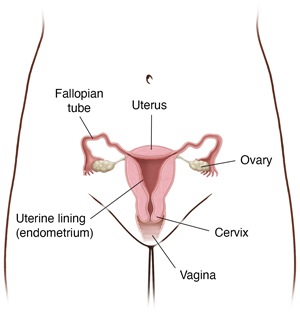Problems Laparoscopic Hysterectomy Can Treat
Some health problems can cause pain or bleeding in the uterus. These problems can sometimes be helped by medicine. Or surgery may be done that keeps the uterus intact. But sometimes the best way to ease pain and bleeding is to remove the uterus using laparoscopic hysterectomy. It’s done using small cuts (incisions).

A hysterectomy can treat these conditions:
-
Fibroids. This is a lump of muscle tissue. It grows in or on the wall of the uterus. It is not cancer. A fibroid can cause pain and heavy bleeding. It may press on the bladder or rectum. This can lead to frequent urination, constipation, and other problems.
-
Endometriosis. This is the growth of the uterine lining outside of the uterus. This tissue can lead to scarring (adhesions). This scarring occurs inside the pelvic cavity. This can cause severe pain.
-
Gynecological cancer. Ovarian, fallopian tube, uterine, and cervical cancers can be treated. Many times, additional tissues are removed when cancer is involved.
-
Endometrial hyperplasia. This is when the endometrium has abnormal cell changes that can lead to cancer of the endometrium.
-
Cervical dysplasia. This is a change in the cervix that can sometimes lead to cervical cancer.
-
Uterine prolapse. This is when the uterus drops from the normal location.
Other problems
Abnormal bleeding may be due to other causes. These include:
Online Medical Reviewer:
Daphne Pierce-Smith RN MSN
Online Medical Reviewer:
Rajadurai Samnishanth Researcher
Online Medical Reviewer:
Raymond Turley Jr PA-C
Date Last Reviewed:
3/1/2025
© 2000-2026 The StayWell Company, LLC. All rights reserved. This information is not intended as a substitute for professional medical care. Always follow your healthcare professional's instructions.